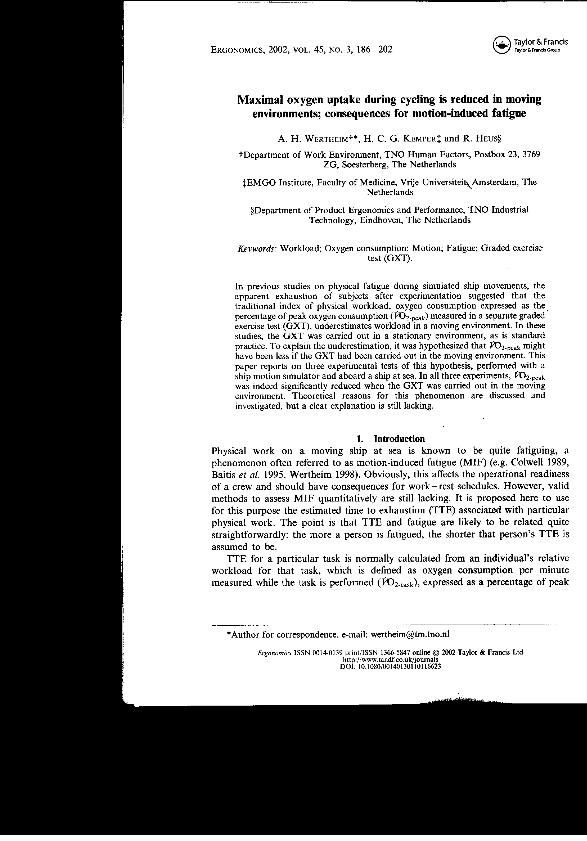Maximal oxygen uptake during cycling is reduced in moving environments; consequences for motion-induced fatigue

Contenido multimedia no disponible por derechos de autor o por acceso restringido. Contacte con la institución para más información.
| Tag | 1 | 2 | Valor |
|---|---|---|---|
| LDR | 00000nab a2200000 i 4500 | ||
| 001 | MAP20071506028 | ||
| 003 | MAP | ||
| 005 | 20080418124922.0 | ||
| 007 | hzruuu---uuuu | ||
| 008 | 041102e20020201gbr|||| | |00010|eng d | ||
| 035 | $a6800012720 | ||
| 040 | $aMAP$bspa | ||
| 084 | $a875 | ||
| 100 | 1 | $0MAPA20080119553$aWertheim, A.H. | |
| 245 | 1 | 0 | $aMaximal oxygen uptake during cycling is reduced in moving environments; consequences for motion-induced fatigue$cA.H. Wertheim, H.C.G. Kemper, R. Reus |
| 520 | 8 | $aIn previous studies on physical fatigue during simulated ship movements, the apparent exhaustion of subjects after experimentation suggested that the traditional index of physical workload, oxygen consumption measured in a separate graded exercise test, underestimates workload in a moving environment. This paper reports on three experimental tests of this hypothesis, performed with a ship motion simulator and aboard a ship at sea | |
| 650 | 1 | 1 | $0MAPA20080547127$aEstudios |
| 650 | 1 | 1 | $0MAPA20080570873$aTrabajo físico |
| 650 | 1 | 1 | $0MAPA20080584252$aConsumo de oxígeno |
| 650 | 1 | 1 | $0MAPA20080540999$aFatiga |
| 650 | 1 | 1 | $0MAPA20080594091$aTransporte marítimo |
| 650 | 1 | 1 | $0MAPA20080560607$aSimuladores |
| 700 | 1 | $0MAPA20080070892$aKemper, H.C.G. | |
| 700 | 1 | $0MAPA20080001636$aHeus, R. | |
| 740 | 0 | $aErgonomics | |
| 773 | 0 | $tErgonomics$dLondon and Washington$gVol. 45, nº 3, February 2002 ; p. 186-202 |

